Contemporary Issues in Healthcare Policy and Practice: Dementia
VerifiedAdded on 2023/01/13
|11
|3712
|64
Report
AI Summary
This report provides a comprehensive overview of contemporary issues in healthcare policy and practice, specifically focusing on dementia. It begins with an introduction to dementia, its various subtypes, and the key symptoms, including early and late-stage indicators. The report then delves into the key issues associated with dementia, presenting UK statistics, particularly in London and the Barking and Dagenham borough. It analyzes the challenges in both local and national healthcare and social care services, highlighting issues such as unemployment, lack of education, and financial constraints. The report also critically analyzes the key issues identified within dementia services, including ensuring safety and security, dealing with financial and legal issues, and the quality of care, along with addressing discrimination. Furthermore, it discusses the driving and restraining forces affecting dementia services and applies Kurt Lewin's change management theory to understand the required changes. The report emphasizes the need for improved healthcare systems, increased awareness, and financial support to address the growing challenges posed by dementia.

CONTEMPORARY ISSUES
IN HEALTHCARE POLICY
AND PRACTICE
TABLE OF CONTENTS
IN HEALTHCARE POLICY
AND PRACTICE
TABLE OF CONTENTS
Paraphrase This Document
Need a fresh take? Get an instant paraphrase of this document with our AI Paraphraser
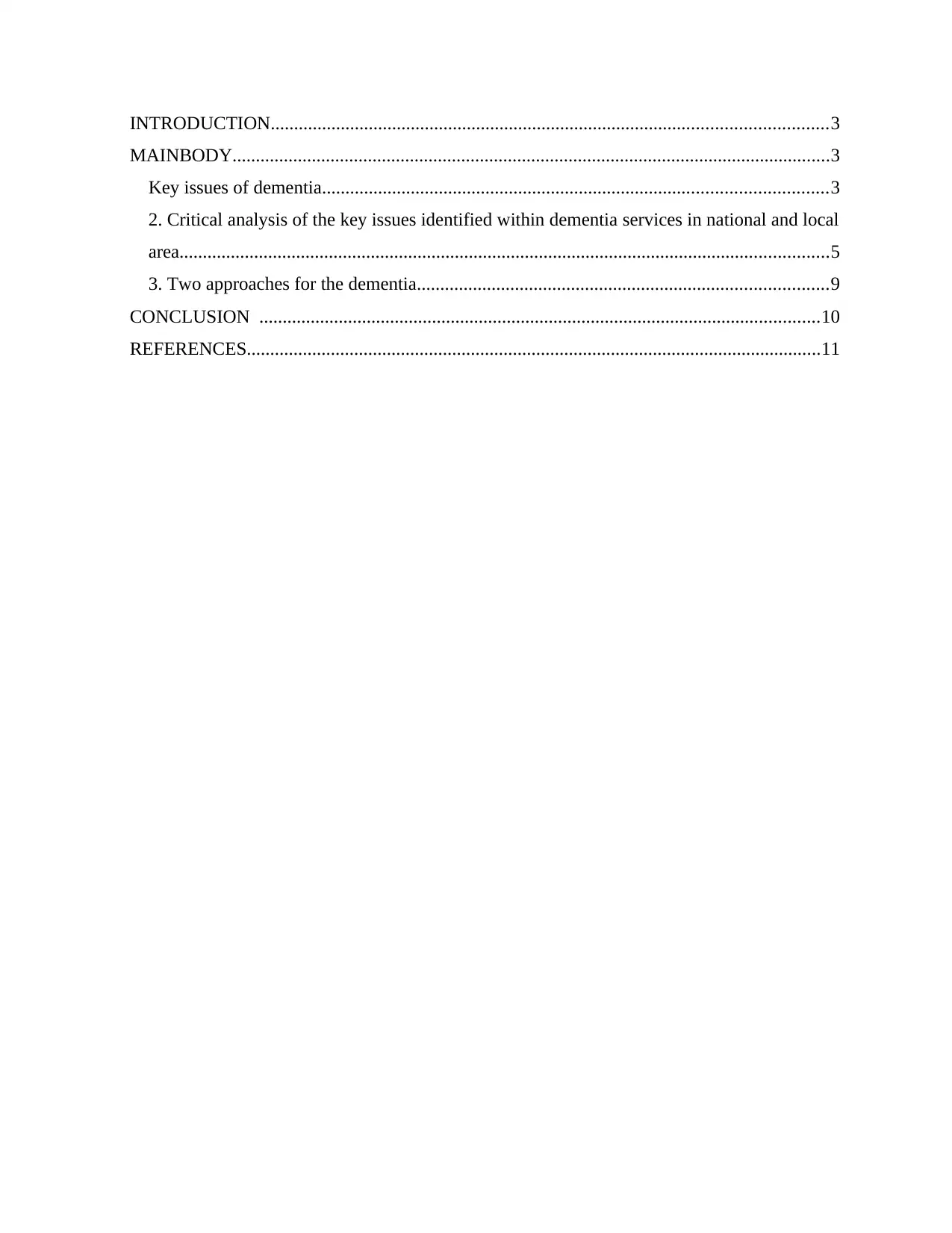
INTRODUCTION.......................................................................................................................3
MAINBODY................................................................................................................................3
Key issues of dementia............................................................................................................3
2. Critical analysis of the key issues identified within dementia services in national and local
area...........................................................................................................................................5
3. Two approaches for the dementia........................................................................................9
CONCLUSION ........................................................................................................................10
REFERENCES...........................................................................................................................11
MAINBODY................................................................................................................................3
Key issues of dementia............................................................................................................3
2. Critical analysis of the key issues identified within dementia services in national and local
area...........................................................................................................................................5
3. Two approaches for the dementia........................................................................................9
CONCLUSION ........................................................................................................................10
REFERENCES...........................................................................................................................11
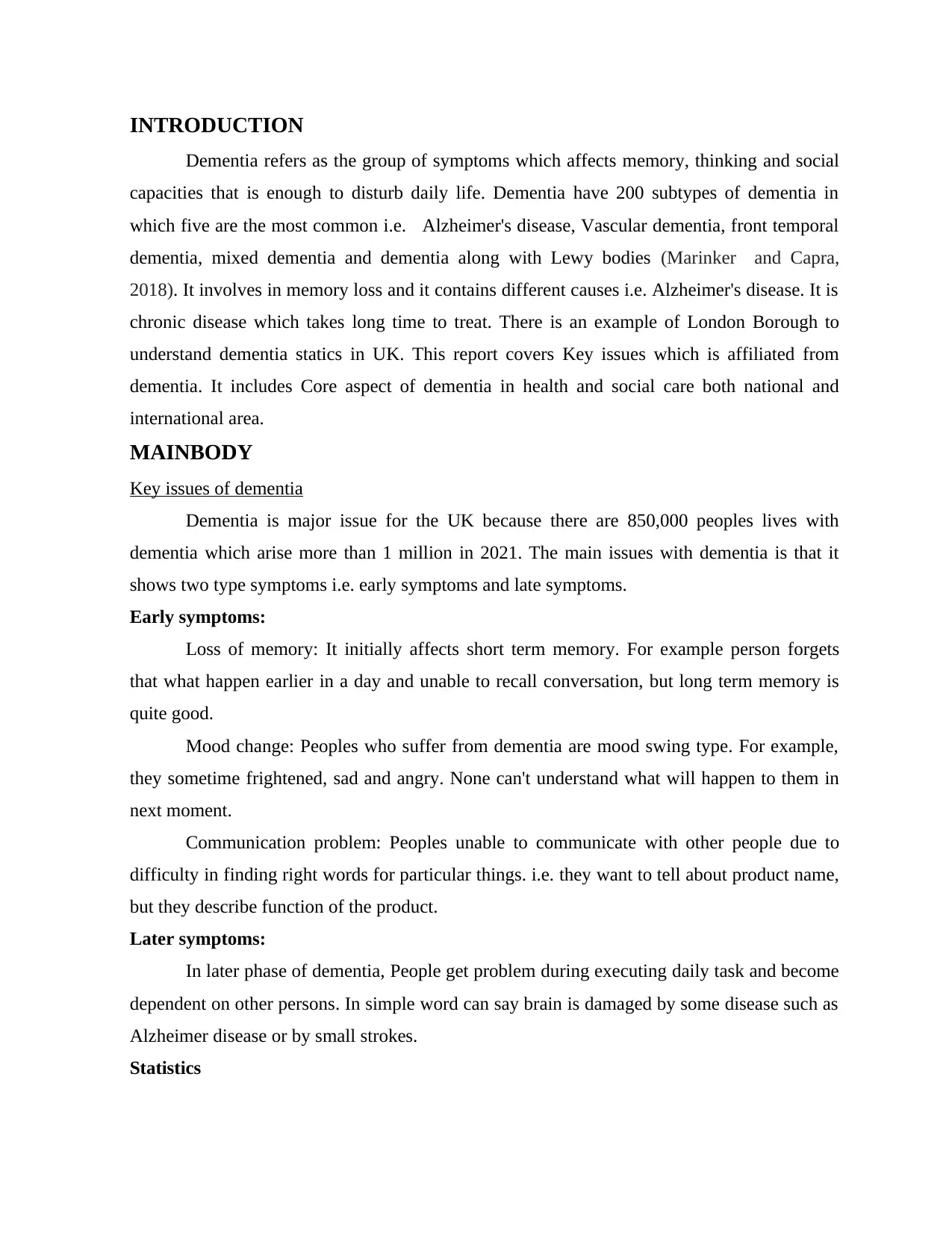
INTRODUCTION
Dementia refers as the group of symptoms which affects memory, thinking and social
capacities that is enough to disturb daily life. Dementia have 200 subtypes of dementia in
which five are the most common i.e. Alzheimer's disease, Vascular dementia, front temporal
dementia, mixed dementia and dementia along with Lewy bodies (Marinker and Capra,
2018). It involves in memory loss and it contains different causes i.e. Alzheimer's disease. It is
chronic disease which takes long time to treat. There is an example of London Borough to
understand dementia statics in UK. This report covers Key issues which is affiliated from
dementia. It includes Core aspect of dementia in health and social care both national and
international area.
MAINBODY
Key issues of dementia
Dementia is major issue for the UK because there are 850,000 peoples lives with
dementia which arise more than 1 million in 2021. The main issues with dementia is that it
shows two type symptoms i.e. early symptoms and late symptoms.
Early symptoms:
Loss of memory: It initially affects short term memory. For example person forgets
that what happen earlier in a day and unable to recall conversation, but long term memory is
quite good.
Mood change: Peoples who suffer from dementia are mood swing type. For example,
they sometime frightened, sad and angry. None can't understand what will happen to them in
next moment.
Communication problem: Peoples unable to communicate with other people due to
difficulty in finding right words for particular things. i.e. they want to tell about product name,
but they describe function of the product.
Later symptoms:
In later phase of dementia, People get problem during executing daily task and become
dependent on other persons. In simple word can say brain is damaged by some disease such as
Alzheimer disease or by small strokes.
Statistics
Dementia refers as the group of symptoms which affects memory, thinking and social
capacities that is enough to disturb daily life. Dementia have 200 subtypes of dementia in
which five are the most common i.e. Alzheimer's disease, Vascular dementia, front temporal
dementia, mixed dementia and dementia along with Lewy bodies (Marinker and Capra,
2018). It involves in memory loss and it contains different causes i.e. Alzheimer's disease. It is
chronic disease which takes long time to treat. There is an example of London Borough to
understand dementia statics in UK. This report covers Key issues which is affiliated from
dementia. It includes Core aspect of dementia in health and social care both national and
international area.
MAINBODY
Key issues of dementia
Dementia is major issue for the UK because there are 850,000 peoples lives with
dementia which arise more than 1 million in 2021. The main issues with dementia is that it
shows two type symptoms i.e. early symptoms and late symptoms.
Early symptoms:
Loss of memory: It initially affects short term memory. For example person forgets
that what happen earlier in a day and unable to recall conversation, but long term memory is
quite good.
Mood change: Peoples who suffer from dementia are mood swing type. For example,
they sometime frightened, sad and angry. None can't understand what will happen to them in
next moment.
Communication problem: Peoples unable to communicate with other people due to
difficulty in finding right words for particular things. i.e. they want to tell about product name,
but they describe function of the product.
Later symptoms:
In later phase of dementia, People get problem during executing daily task and become
dependent on other persons. In simple word can say brain is damaged by some disease such as
Alzheimer disease or by small strokes.
Statistics
⊘ This is a preview!⊘
Do you want full access?
Subscribe today to unlock all pages.

Trusted by 1+ million students worldwide
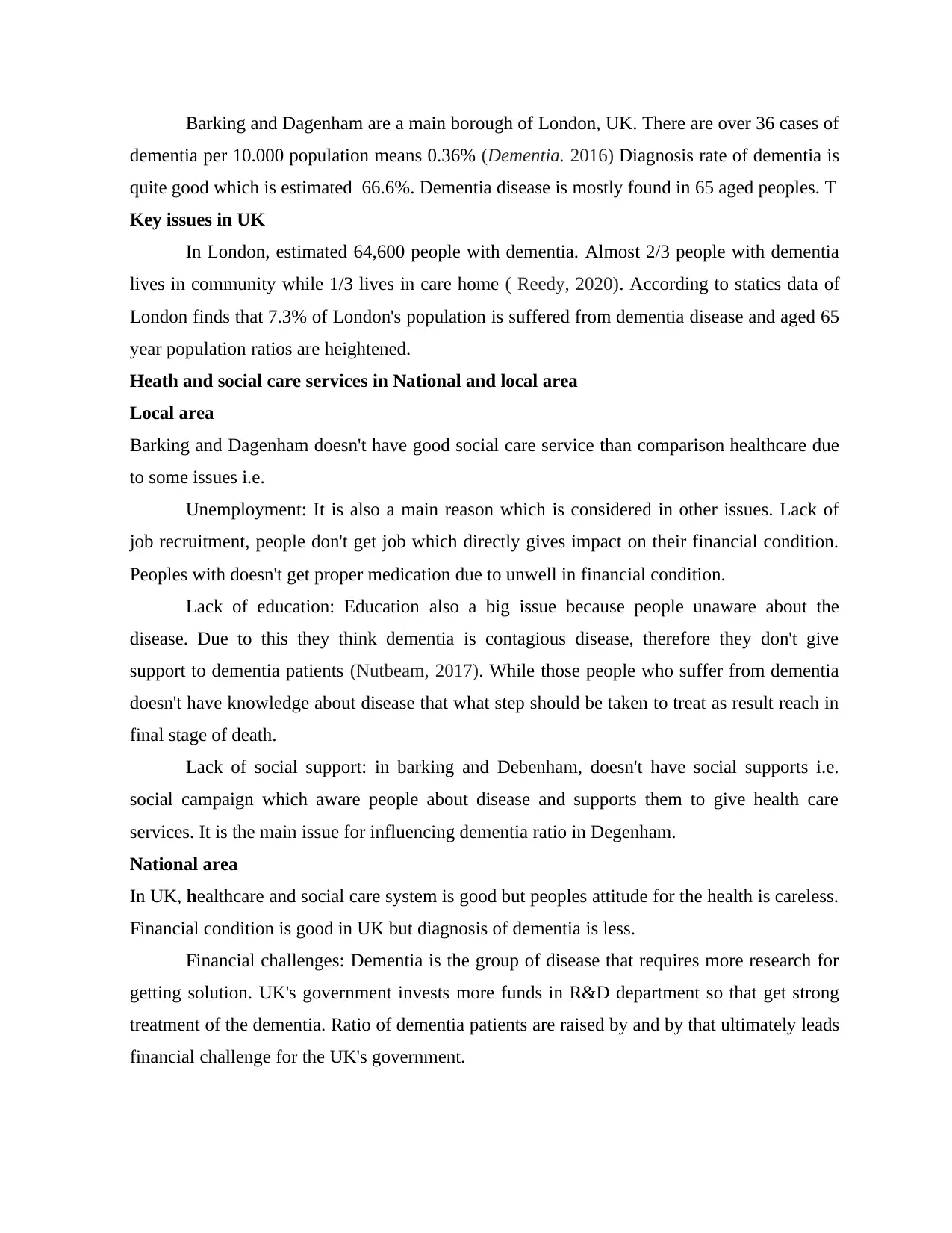
Barking and Dagenham are a main borough of London, UK. There are over 36 cases of
dementia per 10.000 population means 0.36% (Dementia. 2016) Diagnosis rate of dementia is
quite good which is estimated 66.6%. Dementia disease is mostly found in 65 aged peoples. T
Key issues in UK
In London, estimated 64,600 people with dementia. Almost 2/3 people with dementia
lives in community while 1/3 lives in care home ( Reedy, 2020). According to statics data of
London finds that 7.3% of London's population is suffered from dementia disease and aged 65
year population ratios are heightened.
Heath and social care services in National and local area
Local area
Barking and Dagenham doesn't have good social care service than comparison healthcare due
to some issues i.e.
Unemployment: It is also a main reason which is considered in other issues. Lack of
job recruitment, people don't get job which directly gives impact on their financial condition.
Peoples with doesn't get proper medication due to unwell in financial condition.
Lack of education: Education also a big issue because people unaware about the
disease. Due to this they think dementia is contagious disease, therefore they don't give
support to dementia patients (Nutbeam, 2017). While those people who suffer from dementia
doesn't have knowledge about disease that what step should be taken to treat as result reach in
final stage of death.
Lack of social support: in barking and Debenham, doesn't have social supports i.e.
social campaign which aware people about disease and supports them to give health care
services. It is the main issue for influencing dementia ratio in Degenham.
National area
In UK, healthcare and social care system is good but peoples attitude for the health is careless.
Financial condition is good in UK but diagnosis of dementia is less.
Financial challenges: Dementia is the group of disease that requires more research for
getting solution. UK's government invests more funds in R&D department so that get strong
treatment of the dementia. Ratio of dementia patients are raised by and by that ultimately leads
financial challenge for the UK's government.
dementia per 10.000 population means 0.36% (Dementia. 2016) Diagnosis rate of dementia is
quite good which is estimated 66.6%. Dementia disease is mostly found in 65 aged peoples. T
Key issues in UK
In London, estimated 64,600 people with dementia. Almost 2/3 people with dementia
lives in community while 1/3 lives in care home ( Reedy, 2020). According to statics data of
London finds that 7.3% of London's population is suffered from dementia disease and aged 65
year population ratios are heightened.
Heath and social care services in National and local area
Local area
Barking and Dagenham doesn't have good social care service than comparison healthcare due
to some issues i.e.
Unemployment: It is also a main reason which is considered in other issues. Lack of
job recruitment, people don't get job which directly gives impact on their financial condition.
Peoples with doesn't get proper medication due to unwell in financial condition.
Lack of education: Education also a big issue because people unaware about the
disease. Due to this they think dementia is contagious disease, therefore they don't give
support to dementia patients (Nutbeam, 2017). While those people who suffer from dementia
doesn't have knowledge about disease that what step should be taken to treat as result reach in
final stage of death.
Lack of social support: in barking and Debenham, doesn't have social supports i.e.
social campaign which aware people about disease and supports them to give health care
services. It is the main issue for influencing dementia ratio in Degenham.
National area
In UK, healthcare and social care system is good but peoples attitude for the health is careless.
Financial condition is good in UK but diagnosis of dementia is less.
Financial challenges: Dementia is the group of disease that requires more research for
getting solution. UK's government invests more funds in R&D department so that get strong
treatment of the dementia. Ratio of dementia patients are raised by and by that ultimately leads
financial challenge for the UK's government.
Paraphrase This Document
Need a fresh take? Get an instant paraphrase of this document with our AI Paraphraser
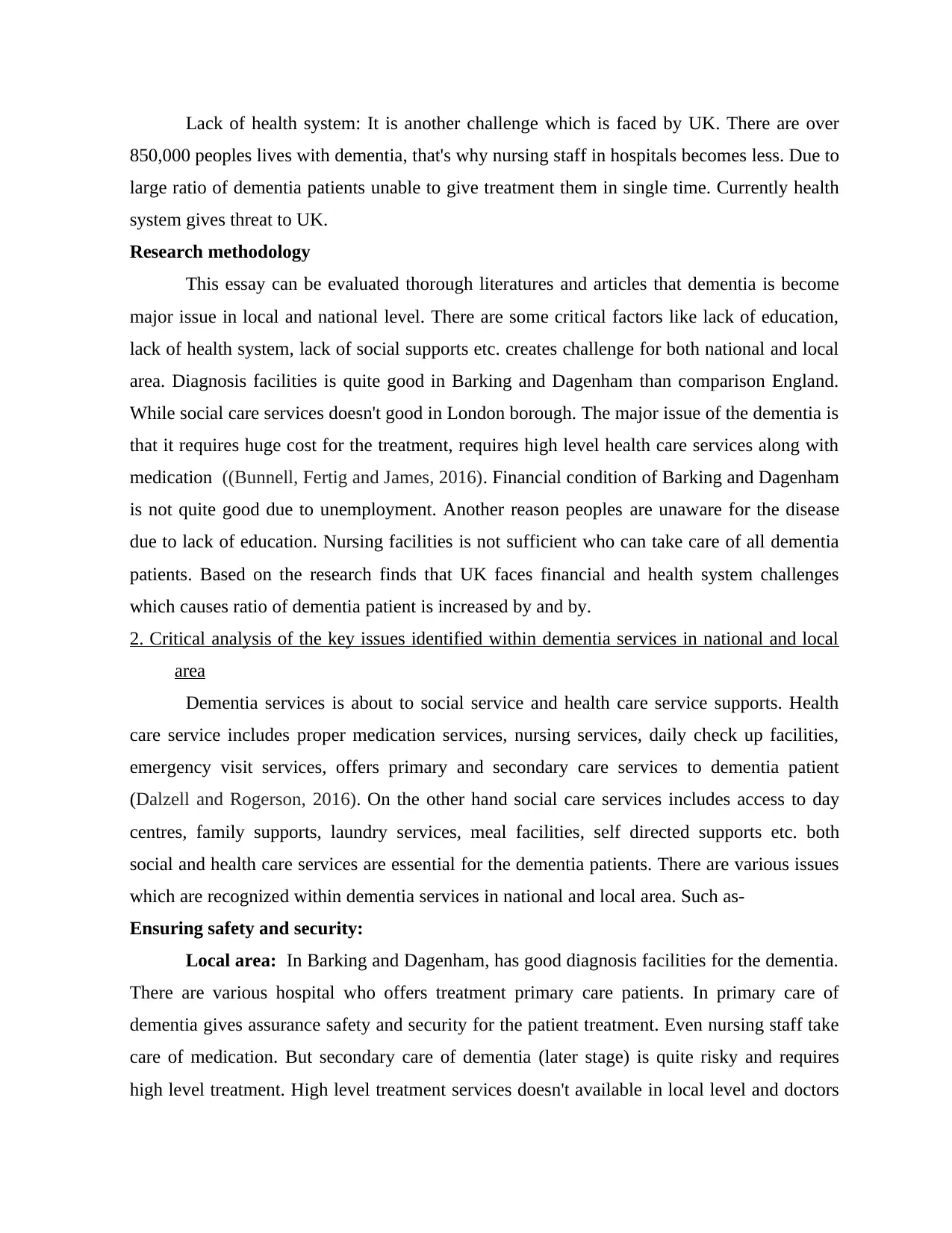
Lack of health system: It is another challenge which is faced by UK. There are over
850,000 peoples lives with dementia, that's why nursing staff in hospitals becomes less. Due to
large ratio of dementia patients unable to give treatment them in single time. Currently health
system gives threat to UK.
Research methodology
This essay can be evaluated thorough literatures and articles that dementia is become
major issue in local and national level. There are some critical factors like lack of education,
lack of health system, lack of social supports etc. creates challenge for both national and local
area. Diagnosis facilities is quite good in Barking and Dagenham than comparison England.
While social care services doesn't good in London borough. The major issue of the dementia is
that it requires huge cost for the treatment, requires high level health care services along with
medication ((Bunnell, Fertig and James, 2016). Financial condition of Barking and Dagenham
is not quite good due to unemployment. Another reason peoples are unaware for the disease
due to lack of education. Nursing facilities is not sufficient who can take care of all dementia
patients. Based on the research finds that UK faces financial and health system challenges
which causes ratio of dementia patient is increased by and by.
2. Critical analysis of the key issues identified within dementia services in national and local
area
Dementia services is about to social service and health care service supports. Health
care service includes proper medication services, nursing services, daily check up facilities,
emergency visit services, offers primary and secondary care services to dementia patient
(Dalzell and Rogerson, 2016). On the other hand social care services includes access to day
centres, family supports, laundry services, meal facilities, self directed supports etc. both
social and health care services are essential for the dementia patients. There are various issues
which are recognized within dementia services in national and local area. Such as-
Ensuring safety and security:
Local area: In Barking and Dagenham, has good diagnosis facilities for the dementia.
There are various hospital who offers treatment primary care patients. In primary care of
dementia gives assurance safety and security for the patient treatment. Even nursing staff take
care of medication. But secondary care of dementia (later stage) is quite risky and requires
high level treatment. High level treatment services doesn't available in local level and doctors
850,000 peoples lives with dementia, that's why nursing staff in hospitals becomes less. Due to
large ratio of dementia patients unable to give treatment them in single time. Currently health
system gives threat to UK.
Research methodology
This essay can be evaluated thorough literatures and articles that dementia is become
major issue in local and national level. There are some critical factors like lack of education,
lack of health system, lack of social supports etc. creates challenge for both national and local
area. Diagnosis facilities is quite good in Barking and Dagenham than comparison England.
While social care services doesn't good in London borough. The major issue of the dementia is
that it requires huge cost for the treatment, requires high level health care services along with
medication ((Bunnell, Fertig and James, 2016). Financial condition of Barking and Dagenham
is not quite good due to unemployment. Another reason peoples are unaware for the disease
due to lack of education. Nursing facilities is not sufficient who can take care of all dementia
patients. Based on the research finds that UK faces financial and health system challenges
which causes ratio of dementia patient is increased by and by.
2. Critical analysis of the key issues identified within dementia services in national and local
area
Dementia services is about to social service and health care service supports. Health
care service includes proper medication services, nursing services, daily check up facilities,
emergency visit services, offers primary and secondary care services to dementia patient
(Dalzell and Rogerson, 2016). On the other hand social care services includes access to day
centres, family supports, laundry services, meal facilities, self directed supports etc. both
social and health care services are essential for the dementia patients. There are various issues
which are recognized within dementia services in national and local area. Such as-
Ensuring safety and security:
Local area: In Barking and Dagenham, has good diagnosis facilities for the dementia.
There are various hospital who offers treatment primary care patients. In primary care of
dementia gives assurance safety and security for the patient treatment. Even nursing staff take
care of medication. But secondary care of dementia (later stage) is quite risky and requires
high level treatment. High level treatment services doesn't available in local level and doctors
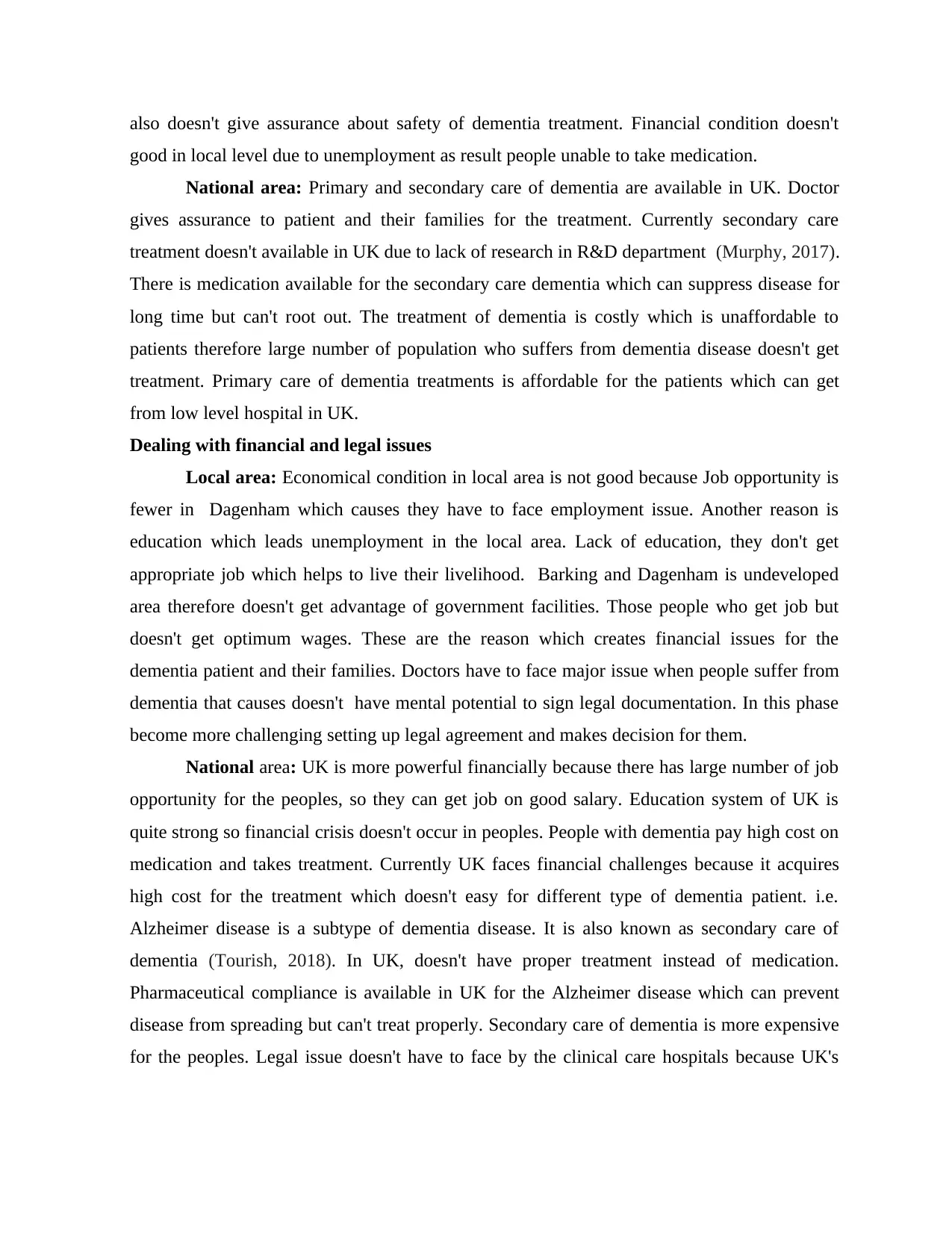
also doesn't give assurance about safety of dementia treatment. Financial condition doesn't
good in local level due to unemployment as result people unable to take medication.
National area: Primary and secondary care of dementia are available in UK. Doctor
gives assurance to patient and their families for the treatment. Currently secondary care
treatment doesn't available in UK due to lack of research in R&D department (Murphy, 2017).
There is medication available for the secondary care dementia which can suppress disease for
long time but can't root out. The treatment of dementia is costly which is unaffordable to
patients therefore large number of population who suffers from dementia disease doesn't get
treatment. Primary care of dementia treatments is affordable for the patients which can get
from low level hospital in UK.
Dealing with financial and legal issues
Local area: Economical condition in local area is not good because Job opportunity is
fewer in Dagenham which causes they have to face employment issue. Another reason is
education which leads unemployment in the local area. Lack of education, they don't get
appropriate job which helps to live their livelihood. Barking and Dagenham is undeveloped
area therefore doesn't get advantage of government facilities. Those people who get job but
doesn't get optimum wages. These are the reason which creates financial issues for the
dementia patient and their families. Doctors have to face major issue when people suffer from
dementia that causes doesn't have mental potential to sign legal documentation. In this phase
become more challenging setting up legal agreement and makes decision for them.
National area: UK is more powerful financially because there has large number of job
opportunity for the peoples, so they can get job on good salary. Education system of UK is
quite strong so financial crisis doesn't occur in peoples. People with dementia pay high cost on
medication and takes treatment. Currently UK faces financial challenges because it acquires
high cost for the treatment which doesn't easy for different type of dementia patient. i.e.
Alzheimer disease is a subtype of dementia disease. It is also known as secondary care of
dementia (Tourish, 2018). In UK, doesn't have proper treatment instead of medication.
Pharmaceutical compliance is available in UK for the Alzheimer disease which can prevent
disease from spreading but can't treat properly. Secondary care of dementia is more expensive
for the peoples. Legal issue doesn't have to face by the clinical care hospitals because UK's
good in local level due to unemployment as result people unable to take medication.
National area: Primary and secondary care of dementia are available in UK. Doctor
gives assurance to patient and their families for the treatment. Currently secondary care
treatment doesn't available in UK due to lack of research in R&D department (Murphy, 2017).
There is medication available for the secondary care dementia which can suppress disease for
long time but can't root out. The treatment of dementia is costly which is unaffordable to
patients therefore large number of population who suffers from dementia disease doesn't get
treatment. Primary care of dementia treatments is affordable for the patients which can get
from low level hospital in UK.
Dealing with financial and legal issues
Local area: Economical condition in local area is not good because Job opportunity is
fewer in Dagenham which causes they have to face employment issue. Another reason is
education which leads unemployment in the local area. Lack of education, they don't get
appropriate job which helps to live their livelihood. Barking and Dagenham is undeveloped
area therefore doesn't get advantage of government facilities. Those people who get job but
doesn't get optimum wages. These are the reason which creates financial issues for the
dementia patient and their families. Doctors have to face major issue when people suffer from
dementia that causes doesn't have mental potential to sign legal documentation. In this phase
become more challenging setting up legal agreement and makes decision for them.
National area: UK is more powerful financially because there has large number of job
opportunity for the peoples, so they can get job on good salary. Education system of UK is
quite strong so financial crisis doesn't occur in peoples. People with dementia pay high cost on
medication and takes treatment. Currently UK faces financial challenges because it acquires
high cost for the treatment which doesn't easy for different type of dementia patient. i.e.
Alzheimer disease is a subtype of dementia disease. It is also known as secondary care of
dementia (Tourish, 2018). In UK, doesn't have proper treatment instead of medication.
Pharmaceutical compliance is available in UK for the Alzheimer disease which can prevent
disease from spreading but can't treat properly. Secondary care of dementia is more expensive
for the peoples. Legal issue doesn't have to face by the clinical care hospitals because UK's
⊘ This is a preview!⊘
Do you want full access?
Subscribe today to unlock all pages.

Trusted by 1+ million students worldwide
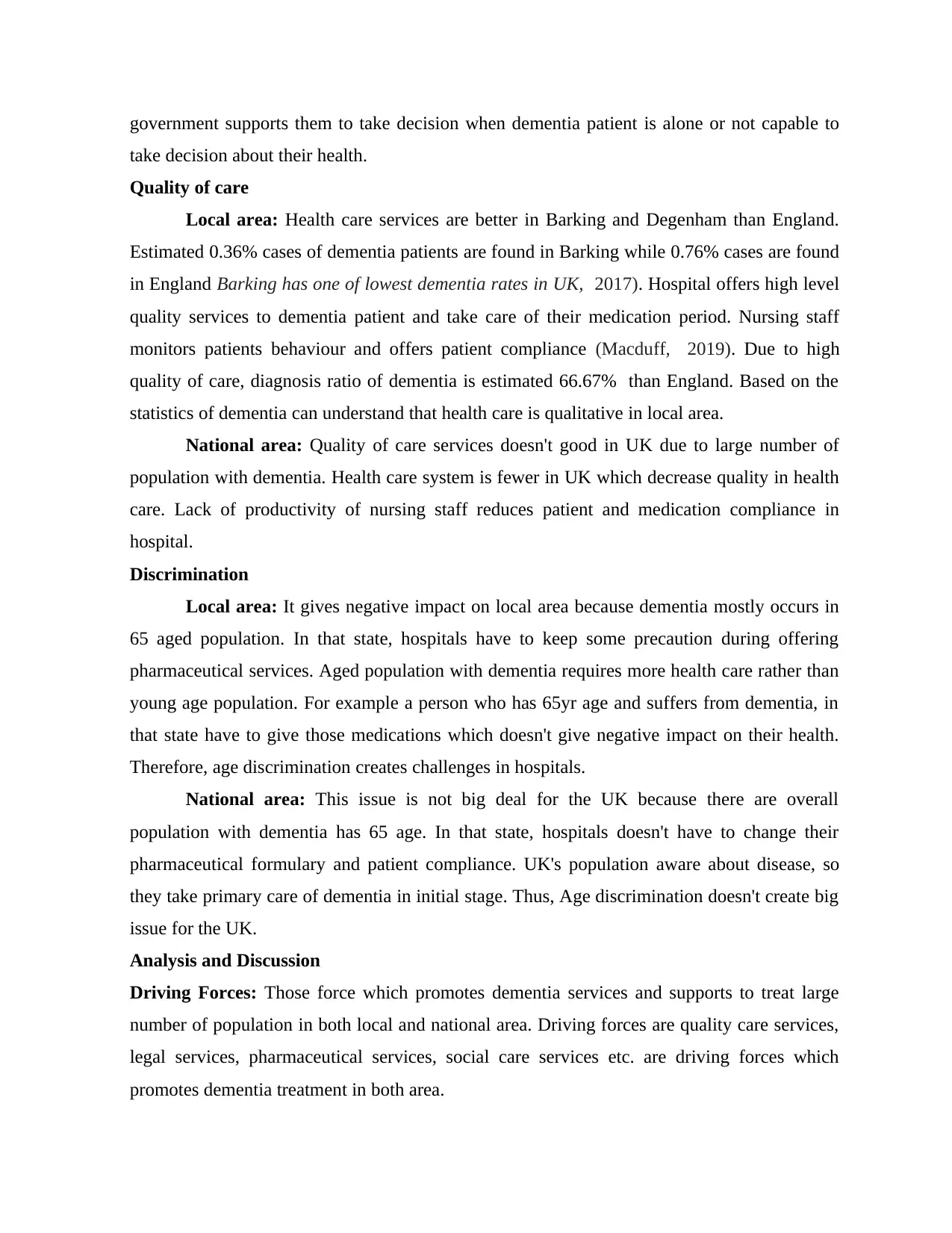
government supports them to take decision when dementia patient is alone or not capable to
take decision about their health.
Quality of care
Local area: Health care services are better in Barking and Degenham than England.
Estimated 0.36% cases of dementia patients are found in Barking while 0.76% cases are found
in England Barking has one of lowest dementia rates in UK, 2017). Hospital offers high level
quality services to dementia patient and take care of their medication period. Nursing staff
monitors patients behaviour and offers patient compliance (Macduff, 2019). Due to high
quality of care, diagnosis ratio of dementia is estimated 66.67% than England. Based on the
statistics of dementia can understand that health care is qualitative in local area.
National area: Quality of care services doesn't good in UK due to large number of
population with dementia. Health care system is fewer in UK which decrease quality in health
care. Lack of productivity of nursing staff reduces patient and medication compliance in
hospital.
Discrimination
Local area: It gives negative impact on local area because dementia mostly occurs in
65 aged population. In that state, hospitals have to keep some precaution during offering
pharmaceutical services. Aged population with dementia requires more health care rather than
young age population. For example a person who has 65yr age and suffers from dementia, in
that state have to give those medications which doesn't give negative impact on their health.
Therefore, age discrimination creates challenges in hospitals.
National area: This issue is not big deal for the UK because there are overall
population with dementia has 65 age. In that state, hospitals doesn't have to change their
pharmaceutical formulary and patient compliance. UK's population aware about disease, so
they take primary care of dementia in initial stage. Thus, Age discrimination doesn't create big
issue for the UK.
Analysis and Discussion
Driving Forces: Those force which promotes dementia services and supports to treat large
number of population in both local and national area. Driving forces are quality care services,
legal services, pharmaceutical services, social care services etc. are driving forces which
promotes dementia treatment in both area.
take decision about their health.
Quality of care
Local area: Health care services are better in Barking and Degenham than England.
Estimated 0.36% cases of dementia patients are found in Barking while 0.76% cases are found
in England Barking has one of lowest dementia rates in UK, 2017). Hospital offers high level
quality services to dementia patient and take care of their medication period. Nursing staff
monitors patients behaviour and offers patient compliance (Macduff, 2019). Due to high
quality of care, diagnosis ratio of dementia is estimated 66.67% than England. Based on the
statistics of dementia can understand that health care is qualitative in local area.
National area: Quality of care services doesn't good in UK due to large number of
population with dementia. Health care system is fewer in UK which decrease quality in health
care. Lack of productivity of nursing staff reduces patient and medication compliance in
hospital.
Discrimination
Local area: It gives negative impact on local area because dementia mostly occurs in
65 aged population. In that state, hospitals have to keep some precaution during offering
pharmaceutical services. Aged population with dementia requires more health care rather than
young age population. For example a person who has 65yr age and suffers from dementia, in
that state have to give those medications which doesn't give negative impact on their health.
Therefore, age discrimination creates challenges in hospitals.
National area: This issue is not big deal for the UK because there are overall
population with dementia has 65 age. In that state, hospitals doesn't have to change their
pharmaceutical formulary and patient compliance. UK's population aware about disease, so
they take primary care of dementia in initial stage. Thus, Age discrimination doesn't create big
issue for the UK.
Analysis and Discussion
Driving Forces: Those force which promotes dementia services and supports to treat large
number of population in both local and national area. Driving forces are quality care services,
legal services, pharmaceutical services, social care services etc. are driving forces which
promotes dementia treatment in both area.
Paraphrase This Document
Need a fresh take? Get an instant paraphrase of this document with our AI Paraphraser
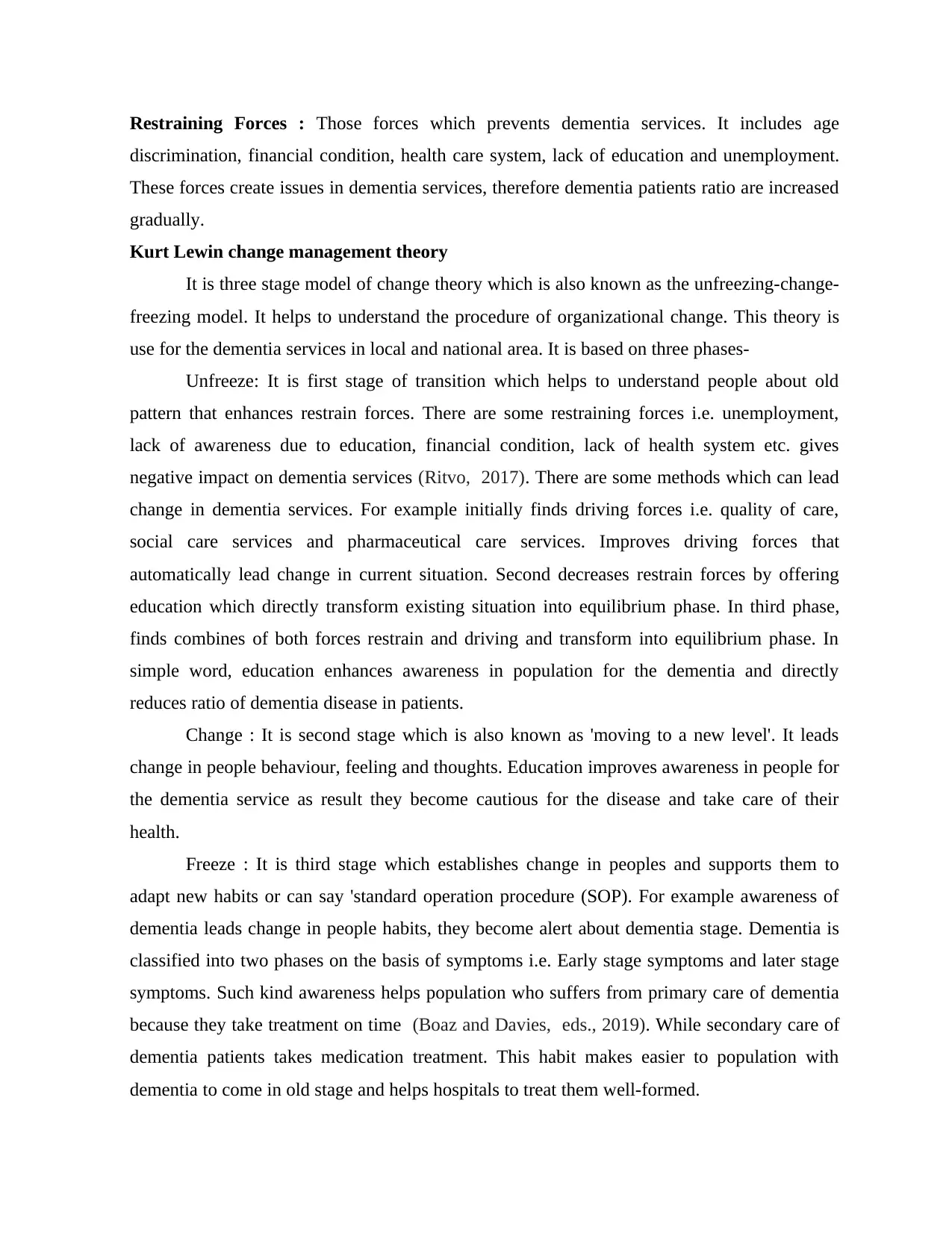
Restraining Forces : Those forces which prevents dementia services. It includes age
discrimination, financial condition, health care system, lack of education and unemployment.
These forces create issues in dementia services, therefore dementia patients ratio are increased
gradually.
Kurt Lewin change management theory
It is three stage model of change theory which is also known as the unfreezing-change-
freezing model. It helps to understand the procedure of organizational change. This theory is
use for the dementia services in local and national area. It is based on three phases-
Unfreeze: It is first stage of transition which helps to understand people about old
pattern that enhances restrain forces. There are some restraining forces i.e. unemployment,
lack of awareness due to education, financial condition, lack of health system etc. gives
negative impact on dementia services (Ritvo, 2017). There are some methods which can lead
change in dementia services. For example initially finds driving forces i.e. quality of care,
social care services and pharmaceutical care services. Improves driving forces that
automatically lead change in current situation. Second decreases restrain forces by offering
education which directly transform existing situation into equilibrium phase. In third phase,
finds combines of both forces restrain and driving and transform into equilibrium phase. In
simple word, education enhances awareness in population for the dementia and directly
reduces ratio of dementia disease in patients.
Change : It is second stage which is also known as 'moving to a new level'. It leads
change in people behaviour, feeling and thoughts. Education improves awareness in people for
the dementia service as result they become cautious for the disease and take care of their
health.
Freeze : It is third stage which establishes change in peoples and supports them to
adapt new habits or can say 'standard operation procedure (SOP). For example awareness of
dementia leads change in people habits, they become alert about dementia stage. Dementia is
classified into two phases on the basis of symptoms i.e. Early stage symptoms and later stage
symptoms. Such kind awareness helps population who suffers from primary care of dementia
because they take treatment on time (Boaz and Davies, eds., 2019). While secondary care of
dementia patients takes medication treatment. This habit makes easier to population with
dementia to come in old stage and helps hospitals to treat them well-formed.
discrimination, financial condition, health care system, lack of education and unemployment.
These forces create issues in dementia services, therefore dementia patients ratio are increased
gradually.
Kurt Lewin change management theory
It is three stage model of change theory which is also known as the unfreezing-change-
freezing model. It helps to understand the procedure of organizational change. This theory is
use for the dementia services in local and national area. It is based on three phases-
Unfreeze: It is first stage of transition which helps to understand people about old
pattern that enhances restrain forces. There are some restraining forces i.e. unemployment,
lack of awareness due to education, financial condition, lack of health system etc. gives
negative impact on dementia services (Ritvo, 2017). There are some methods which can lead
change in dementia services. For example initially finds driving forces i.e. quality of care,
social care services and pharmaceutical care services. Improves driving forces that
automatically lead change in current situation. Second decreases restrain forces by offering
education which directly transform existing situation into equilibrium phase. In third phase,
finds combines of both forces restrain and driving and transform into equilibrium phase. In
simple word, education enhances awareness in population for the dementia and directly
reduces ratio of dementia disease in patients.
Change : It is second stage which is also known as 'moving to a new level'. It leads
change in people behaviour, feeling and thoughts. Education improves awareness in people for
the dementia service as result they become cautious for the disease and take care of their
health.
Freeze : It is third stage which establishes change in peoples and supports them to
adapt new habits or can say 'standard operation procedure (SOP). For example awareness of
dementia leads change in people habits, they become alert about dementia stage. Dementia is
classified into two phases on the basis of symptoms i.e. Early stage symptoms and later stage
symptoms. Such kind awareness helps population who suffers from primary care of dementia
because they take treatment on time (Boaz and Davies, eds., 2019). While secondary care of
dementia patients takes medication treatment. This habit makes easier to population with
dementia to come in old stage and helps hospitals to treat them well-formed.
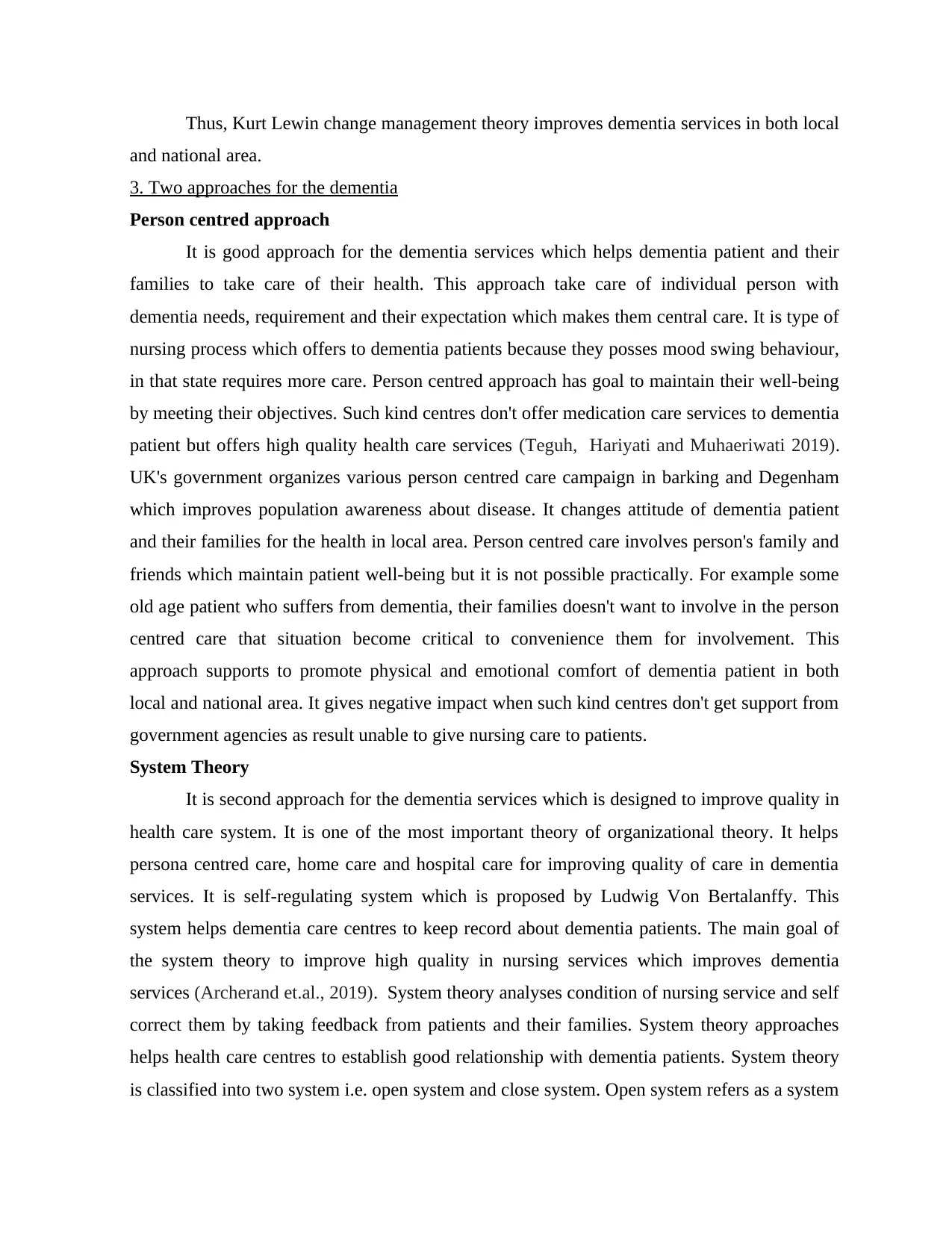
Thus, Kurt Lewin change management theory improves dementia services in both local
and national area.
3. Two approaches for the dementia
Person centred approach
It is good approach for the dementia services which helps dementia patient and their
families to take care of their health. This approach take care of individual person with
dementia needs, requirement and their expectation which makes them central care. It is type of
nursing process which offers to dementia patients because they posses mood swing behaviour,
in that state requires more care. Person centred approach has goal to maintain their well-being
by meeting their objectives. Such kind centres don't offer medication care services to dementia
patient but offers high quality health care services (Teguh, Hariyati and Muhaeriwati 2019).
UK's government organizes various person centred care campaign in barking and Degenham
which improves population awareness about disease. It changes attitude of dementia patient
and their families for the health in local area. Person centred care involves person's family and
friends which maintain patient well-being but it is not possible practically. For example some
old age patient who suffers from dementia, their families doesn't want to involve in the person
centred care that situation become critical to convenience them for involvement. This
approach supports to promote physical and emotional comfort of dementia patient in both
local and national area. It gives negative impact when such kind centres don't get support from
government agencies as result unable to give nursing care to patients.
System Theory
It is second approach for the dementia services which is designed to improve quality in
health care system. It is one of the most important theory of organizational theory. It helps
persona centred care, home care and hospital care for improving quality of care in dementia
services. It is self-regulating system which is proposed by Ludwig Von Bertalanffy. This
system helps dementia care centres to keep record about dementia patients. The main goal of
the system theory to improve high quality in nursing services which improves dementia
services (Archerand et.al., 2019). System theory analyses condition of nursing service and self
correct them by taking feedback from patients and their families. System theory approaches
helps health care centres to establish good relationship with dementia patients. System theory
is classified into two system i.e. open system and close system. Open system refers as a system
and national area.
3. Two approaches for the dementia
Person centred approach
It is good approach for the dementia services which helps dementia patient and their
families to take care of their health. This approach take care of individual person with
dementia needs, requirement and their expectation which makes them central care. It is type of
nursing process which offers to dementia patients because they posses mood swing behaviour,
in that state requires more care. Person centred approach has goal to maintain their well-being
by meeting their objectives. Such kind centres don't offer medication care services to dementia
patient but offers high quality health care services (Teguh, Hariyati and Muhaeriwati 2019).
UK's government organizes various person centred care campaign in barking and Degenham
which improves population awareness about disease. It changes attitude of dementia patient
and their families for the health in local area. Person centred care involves person's family and
friends which maintain patient well-being but it is not possible practically. For example some
old age patient who suffers from dementia, their families doesn't want to involve in the person
centred care that situation become critical to convenience them for involvement. This
approach supports to promote physical and emotional comfort of dementia patient in both
local and national area. It gives negative impact when such kind centres don't get support from
government agencies as result unable to give nursing care to patients.
System Theory
It is second approach for the dementia services which is designed to improve quality in
health care system. It is one of the most important theory of organizational theory. It helps
persona centred care, home care and hospital care for improving quality of care in dementia
services. It is self-regulating system which is proposed by Ludwig Von Bertalanffy. This
system helps dementia care centres to keep record about dementia patients. The main goal of
the system theory to improve high quality in nursing services which improves dementia
services (Archerand et.al., 2019). System theory analyses condition of nursing service and self
correct them by taking feedback from patients and their families. System theory approaches
helps health care centres to establish good relationship with dementia patients. System theory
is classified into two system i.e. open system and close system. Open system refers as a system
⊘ This is a preview!⊘
Do you want full access?
Subscribe today to unlock all pages.

Trusted by 1+ million students worldwide
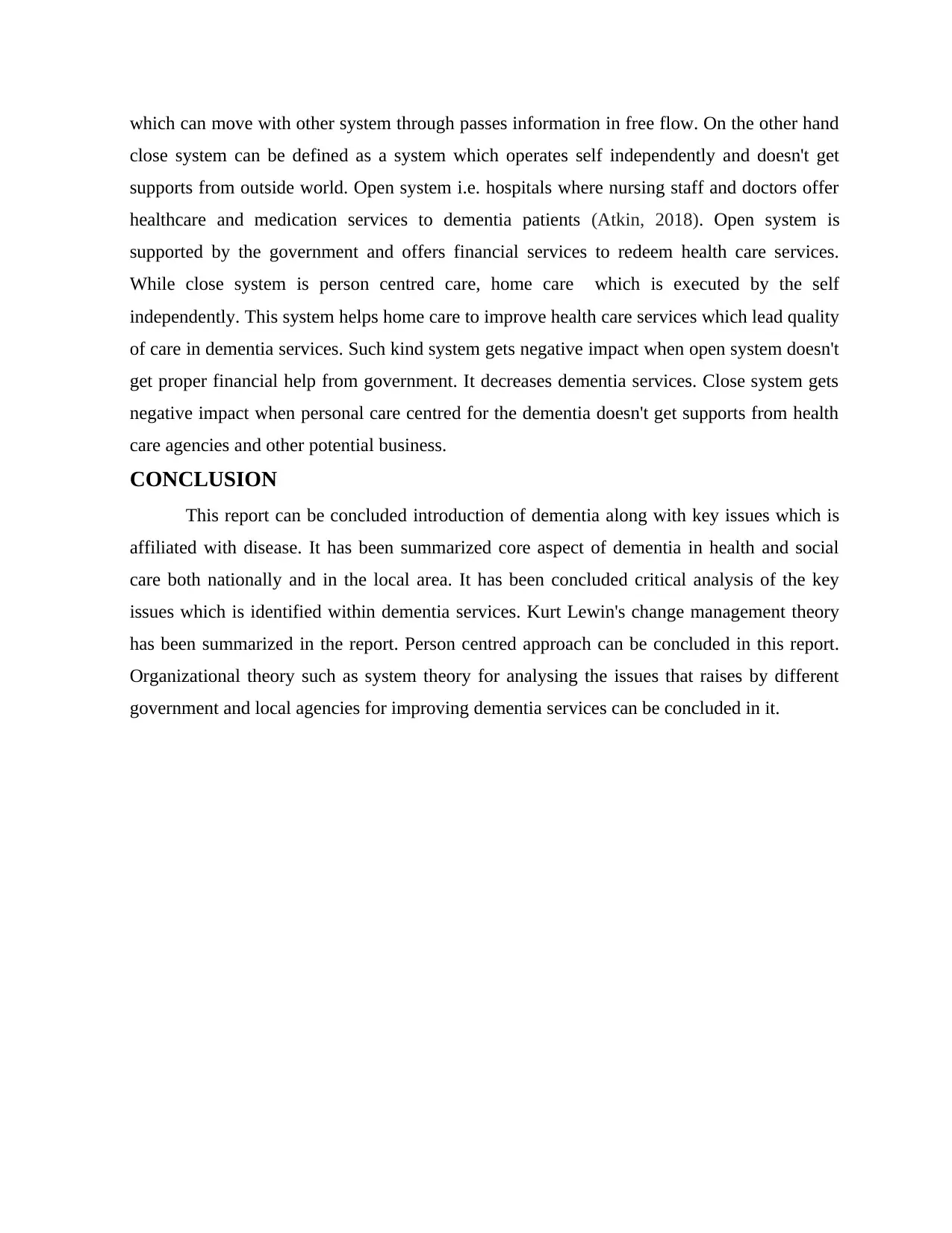
which can move with other system through passes information in free flow. On the other hand
close system can be defined as a system which operates self independently and doesn't get
supports from outside world. Open system i.e. hospitals where nursing staff and doctors offer
healthcare and medication services to dementia patients (Atkin, 2018). Open system is
supported by the government and offers financial services to redeem health care services.
While close system is person centred care, home care which is executed by the self
independently. This system helps home care to improve health care services which lead quality
of care in dementia services. Such kind system gets negative impact when open system doesn't
get proper financial help from government. It decreases dementia services. Close system gets
negative impact when personal care centred for the dementia doesn't get supports from health
care agencies and other potential business.
CONCLUSION
This report can be concluded introduction of dementia along with key issues which is
affiliated with disease. It has been summarized core aspect of dementia in health and social
care both nationally and in the local area. It has been concluded critical analysis of the key
issues which is identified within dementia services. Kurt Lewin's change management theory
has been summarized in the report. Person centred approach can be concluded in this report.
Organizational theory such as system theory for analysing the issues that raises by different
government and local agencies for improving dementia services can be concluded in it.
close system can be defined as a system which operates self independently and doesn't get
supports from outside world. Open system i.e. hospitals where nursing staff and doctors offer
healthcare and medication services to dementia patients (Atkin, 2018). Open system is
supported by the government and offers financial services to redeem health care services.
While close system is person centred care, home care which is executed by the self
independently. This system helps home care to improve health care services which lead quality
of care in dementia services. Such kind system gets negative impact when open system doesn't
get proper financial help from government. It decreases dementia services. Close system gets
negative impact when personal care centred for the dementia doesn't get supports from health
care agencies and other potential business.
CONCLUSION
This report can be concluded introduction of dementia along with key issues which is
affiliated with disease. It has been summarized core aspect of dementia in health and social
care both nationally and in the local area. It has been concluded critical analysis of the key
issues which is identified within dementia services. Kurt Lewin's change management theory
has been summarized in the report. Person centred approach can be concluded in this report.
Organizational theory such as system theory for analysing the issues that raises by different
government and local agencies for improving dementia services can be concluded in it.
Paraphrase This Document
Need a fresh take? Get an instant paraphrase of this document with our AI Paraphraser
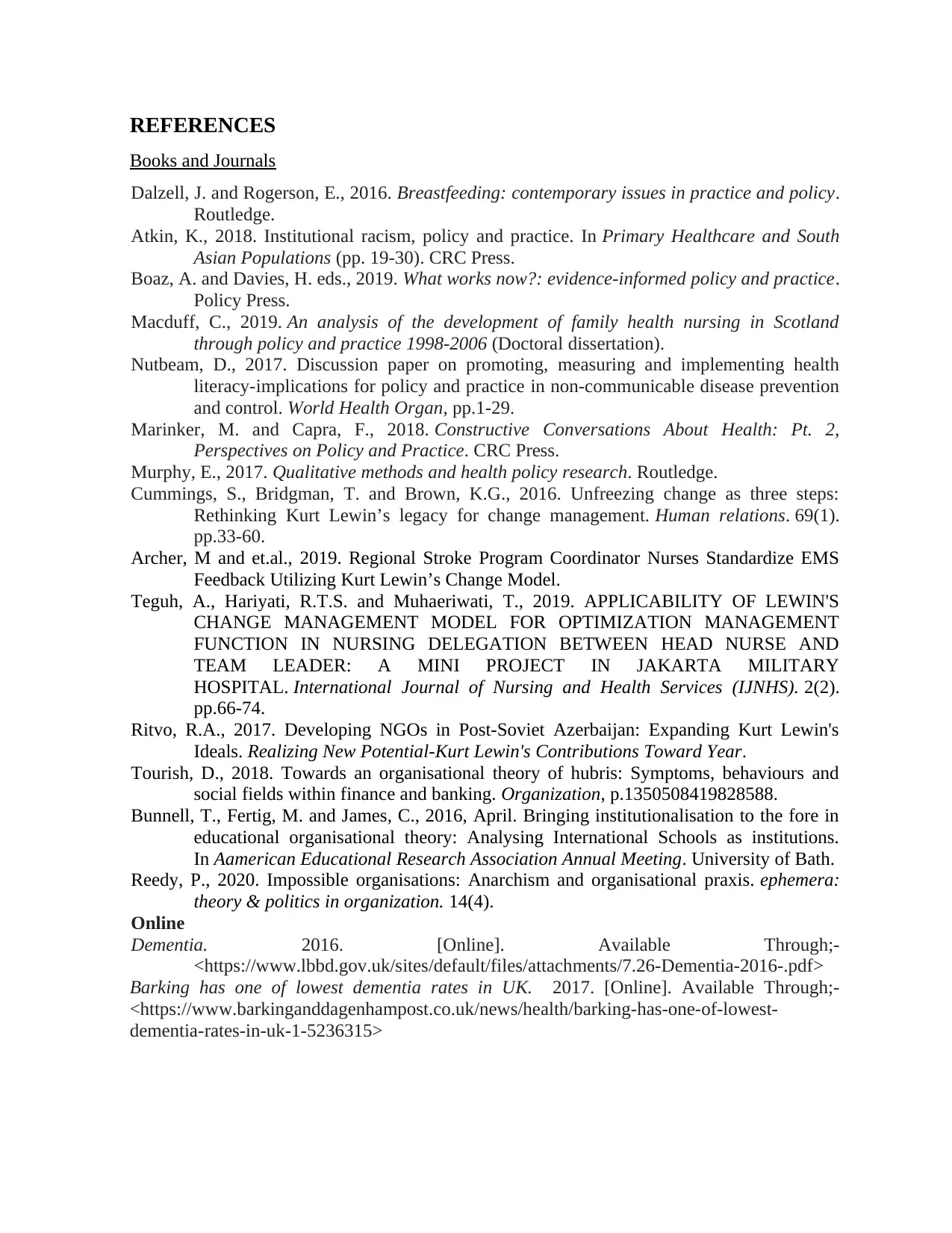
REFERENCES
Books and Journals
Dalzell, J. and Rogerson, E., 2016. Breastfeeding: contemporary issues in practice and policy.
Routledge.
Atkin, K., 2018. Institutional racism, policy and practice. In Primary Healthcare and South
Asian Populations (pp. 19-30). CRC Press.
Boaz, A. and Davies, H. eds., 2019. What works now?: evidence-informed policy and practice.
Policy Press.
Macduff, C., 2019. An analysis of the development of family health nursing in Scotland
through policy and practice 1998-2006 (Doctoral dissertation).
Nutbeam, D., 2017. Discussion paper on promoting, measuring and implementing health
literacy-implications for policy and practice in non-communicable disease prevention
and control. World Health Organ, pp.1-29.
Marinker, M. and Capra, F., 2018. Constructive Conversations About Health: Pt. 2,
Perspectives on Policy and Practice. CRC Press.
Murphy, E., 2017. Qualitative methods and health policy research. Routledge.
Cummings, S., Bridgman, T. and Brown, K.G., 2016. Unfreezing change as three steps:
Rethinking Kurt Lewin’s legacy for change management. Human relations. 69(1).
pp.33-60.
Archer, M and et.al., 2019. Regional Stroke Program Coordinator Nurses Standardize EMS
Feedback Utilizing Kurt Lewin’s Change Model.
Teguh, A., Hariyati, R.T.S. and Muhaeriwati, T., 2019. APPLICABILITY OF LEWIN'S
CHANGE MANAGEMENT MODEL FOR OPTIMIZATION MANAGEMENT
FUNCTION IN NURSING DELEGATION BETWEEN HEAD NURSE AND
TEAM LEADER: A MINI PROJECT IN JAKARTA MILITARY
HOSPITAL. International Journal of Nursing and Health Services (IJNHS). 2(2).
pp.66-74.
Ritvo, R.A., 2017. Developing NGOs in Post-Soviet Azerbaijan: Expanding Kurt Lewin's
Ideals. Realizing New Potential-Kurt Lewin's Contributions Toward Year.
Tourish, D., 2018. Towards an organisational theory of hubris: Symptoms, behaviours and
social fields within finance and banking. Organization, p.1350508419828588.
Bunnell, T., Fertig, M. and James, C., 2016, April. Bringing institutionalisation to the fore in
educational organisational theory: Analysing International Schools as institutions.
In Aamerican Educational Research Association Annual Meeting. University of Bath.
Reedy, P., 2020. Impossible organisations: Anarchism and organisational praxis. ephemera:
theory & politics in organization. 14(4).
Online
Dementia. 2016. [Online]. Available Through;-
<https://www.lbbd.gov.uk/sites/default/files/attachments/7.26-Dementia-2016-.pdf>
Barking has one of lowest dementia rates in UK. 2017. [Online]. Available Through;-
<https://www.barkinganddagenhampost.co.uk/news/health/barking-has-one-of-lowest-
dementia-rates-in-uk-1-5236315>
Books and Journals
Dalzell, J. and Rogerson, E., 2016. Breastfeeding: contemporary issues in practice and policy.
Routledge.
Atkin, K., 2018. Institutional racism, policy and practice. In Primary Healthcare and South
Asian Populations (pp. 19-30). CRC Press.
Boaz, A. and Davies, H. eds., 2019. What works now?: evidence-informed policy and practice.
Policy Press.
Macduff, C., 2019. An analysis of the development of family health nursing in Scotland
through policy and practice 1998-2006 (Doctoral dissertation).
Nutbeam, D., 2017. Discussion paper on promoting, measuring and implementing health
literacy-implications for policy and practice in non-communicable disease prevention
and control. World Health Organ, pp.1-29.
Marinker, M. and Capra, F., 2018. Constructive Conversations About Health: Pt. 2,
Perspectives on Policy and Practice. CRC Press.
Murphy, E., 2017. Qualitative methods and health policy research. Routledge.
Cummings, S., Bridgman, T. and Brown, K.G., 2016. Unfreezing change as three steps:
Rethinking Kurt Lewin’s legacy for change management. Human relations. 69(1).
pp.33-60.
Archer, M and et.al., 2019. Regional Stroke Program Coordinator Nurses Standardize EMS
Feedback Utilizing Kurt Lewin’s Change Model.
Teguh, A., Hariyati, R.T.S. and Muhaeriwati, T., 2019. APPLICABILITY OF LEWIN'S
CHANGE MANAGEMENT MODEL FOR OPTIMIZATION MANAGEMENT
FUNCTION IN NURSING DELEGATION BETWEEN HEAD NURSE AND
TEAM LEADER: A MINI PROJECT IN JAKARTA MILITARY
HOSPITAL. International Journal of Nursing and Health Services (IJNHS). 2(2).
pp.66-74.
Ritvo, R.A., 2017. Developing NGOs in Post-Soviet Azerbaijan: Expanding Kurt Lewin's
Ideals. Realizing New Potential-Kurt Lewin's Contributions Toward Year.
Tourish, D., 2018. Towards an organisational theory of hubris: Symptoms, behaviours and
social fields within finance and banking. Organization, p.1350508419828588.
Bunnell, T., Fertig, M. and James, C., 2016, April. Bringing institutionalisation to the fore in
educational organisational theory: Analysing International Schools as institutions.
In Aamerican Educational Research Association Annual Meeting. University of Bath.
Reedy, P., 2020. Impossible organisations: Anarchism and organisational praxis. ephemera:
theory & politics in organization. 14(4).
Online
Dementia. 2016. [Online]. Available Through;-
<https://www.lbbd.gov.uk/sites/default/files/attachments/7.26-Dementia-2016-.pdf>
Barking has one of lowest dementia rates in UK. 2017. [Online]. Available Through;-
<https://www.barkinganddagenhampost.co.uk/news/health/barking-has-one-of-lowest-
dementia-rates-in-uk-1-5236315>
1 out of 11
Related Documents
Your All-in-One AI-Powered Toolkit for Academic Success.
+13062052269
info@desklib.com
Available 24*7 on WhatsApp / Email
![[object Object]](/_next/static/media/star-bottom.7253800d.svg)
Unlock your academic potential
Copyright © 2020–2026 A2Z Services. All Rights Reserved. Developed and managed by ZUCOL.





